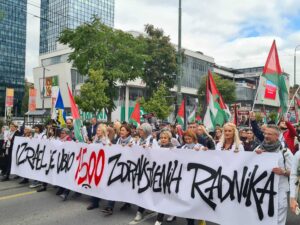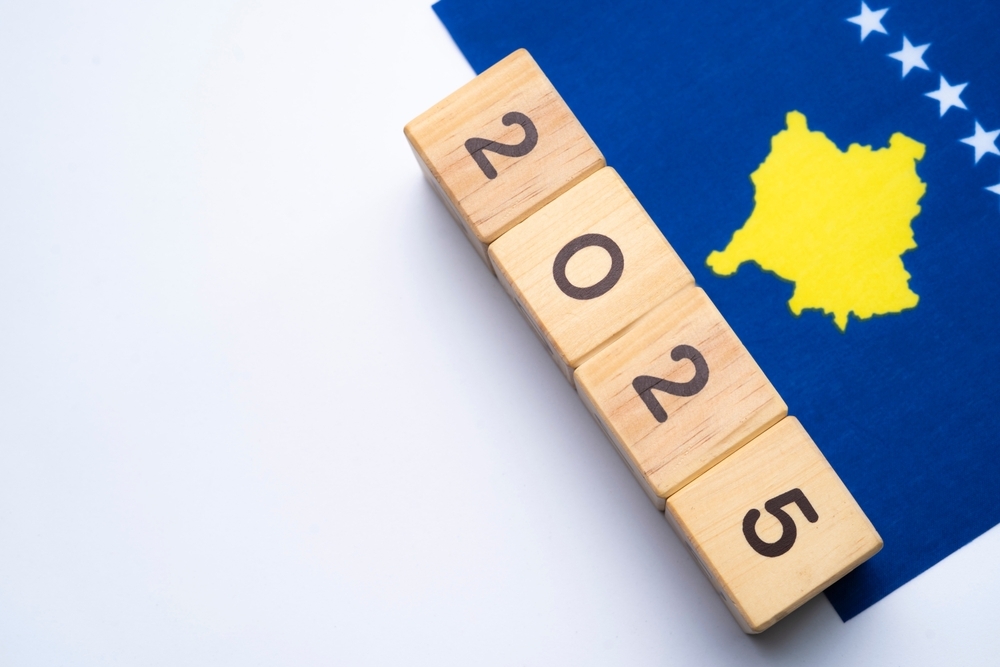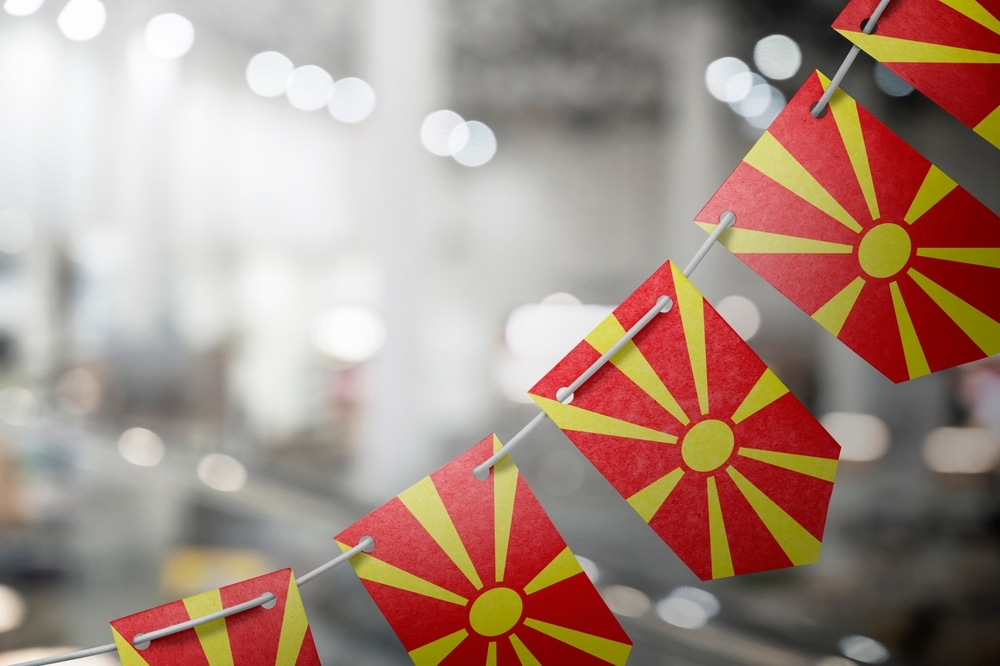Sarajevo: Reading the names of Gaza’s murdered children
“We will keep speaking, protesting and demanding justice, until Palestine is free”, announces a group of Sarajevo residents who have been gathering weekly since Febuary 2024 to read aloud the names of children killed in Gaza

Mess, Sarajevo, October 2025 (foto MESS/Nihad Kreševljaković)
Mess, Sarajevo, October 2025 (foto MESS/Nihad Kreševljaković)
(Originally published by Al Jazeera , 10 October 2025)
Every Tuesday evening, the names of children murdered in Gaza echo along the busiest pedestrian street in the very heart of Sarajevo, right next to the Eternal Flame, a symbol of antifascism.
“Noura Walid Abdulsalam Shaheen (0 years old)… Maryam Nour Al-Din Wael Daban (0 years old)… Fatima Louay Rafiq Al-Sultan (0 years old)… Watan Mohammed Abd Al-Rahim Al-Madhoon (0 years old)… Diyaa Ahmed Abd Al-Aati Saleh Moussa (0 years old)… Sarah Abd Al-Rahman Mohammed Hamad (0 years old)…”.
Name after name, hour after hour, week after week, month after month… two years… eight decades… from newborns to those who never lived to reach adulthood.
Even if the whole world lined up and read those names, it would go on forever.
Culture of remembrance
In Sarajevo, the capital of Bosnia and Herzegovina, a small group of citizens took on the role of the world as it should be.
They carry the flags of Palestine, along with banners demanding freedom, peace and justice, and endless lists of names of Palestinian children killed in what a United Nations independent inquiry classified as genocide.
“… Jenan Hamid Nasser Al-Astal (one year old)… Abdulrahman Sharif Mohammed Abu-Ma’mar (one year old)… Sham Arabi Abd Al-Qader Al-Zubaidi (one year old)… Nasr Khalid Nasr Al-Jad (one year old)… Julia Fawzi Saeed Al-Kurd (one year old)…“.
The reading of names continues until their throats dry out and voices turn hoarse, but they never stop.
Their empathy is not abstract; it is rooted in their own survival, when Sarajevo was besieged by Bosnian Serb forces, from 1992 to 1995. During the siege 1,601 children were killed by shelling and sniper fire.
Former Bosnian Serb political leader Radovan Karadžić was sentenced by the International Criminal Tribunal for the Former Yugoslavia (ICTY) to life imprisonment after being found guilty of genocide in Srebrenica (1995), crimes against humanity, persecution, murder and the terror against civilians during the siege of Sarajevo.
The same sentence was issued against Ratko Mladić, the commander of Bosnian Serb forces, found guilty of the Srebrenica genocide, persecution and extermination of non-Serb civilians, the siege of Sarajevo, and of holding UN peacekeepers hostage.
On the sidelines of the latest UN summit, Serbian President Aleksandar Vučić, who had visited Bosnian Serb artillery positions during the war in Bosnia, met with Israeli Prime Minister Benjamin Netanyahu, shortly after numerous delegations left the hall in protest against Israel’s relentless destruction and starvation of Gaza.
Open support for Israel also comes from Bosnian Serb leader Milorad Dodik and Bosnian Croat leader Dragan Čović.
“Hani Yousef Hani Azzam (two years old)… Sila Jihad Maher Shatat (two years old)… Wateen Mohammad Salem Al-Hashash (two years old)… Julia Amjad Jamil Abu-Hussein (two years old)… Farah Salah Al-Din Khalil Baraka (two years old)… Nahla Alaa Adel Abu-Mohsen (two years old)…”.
In Sarajevo, the culture of remembrance is still alive, along with the effort to preserve the truth and to transform pain, courage and humanity into a compass for a more just and compassionate future.
Many members of the group that reads the names of the murdered children of Gaza are among the most devoted guardians of that memory, now extending it to Palestine.
They recently opened the MESS International Theatre Festival, the oldest festival in Bosnia and Herzegovina, founded in 1960 and one the most renowned in the region.
In the crowded hall of Sarajevo’s National Theatre the group joined Festival Director Nihad Kreševljaković on stage reading the names of Gaza’s murdered children, as they have been doing continuously since February 2024.
“Lana Washah (three years old)… Sara Muhammad Khalil Khalil Asaliyah (three years old)… Maryam Ahmad Abd Al-Raouf Al-Halabi (three years old)… Hamza Rami Nidal Alaywa (three years old)… Zaina Nasser Husni Musa (three years old)…”.
“The genocide in Gaza has been going on for more than two years. It is a symptom of a system that does not care for life, truth or justice“, said Nihad Kreševljaković.
He pointed out that much of the world remains silent in the face of such brutality.
“In a time when wars never end, when borders turn into barbed wire, and when suffering is swept under the carpet of global indifference, theatre, as we know it, should be a place where we seek the human within ourselves. Art should not be silent. Theatre should not be a decoration for disaster. It should not be an escape from responsibility“.
A Space of Resistance
“This festival does not offer answers“, added Kreševljaković , “but raises questions and offers what our society lacks the most – empathy. In a world that is burning before our eyes, art must continue to seek humanity. This city, this country and this festival know this from their own experience. MESS will continue to speak even when the world falls silent because we believe theatre is a space of resistance, and a call to remain human“.
“Ali Nail Naeem Okasha (four years old)… Saeed Hazem Saeed Al-Ramlawi (four years old)… Mahmoud Abd Al-Aziz Mohammed Zahir (four years old)… Saja Zahir Abd Al-Hakim Kaheel (four years old)… Baraa Ziad Anwar Abu-Mustafa (four years old)…”.
When the reading ended, there was no applause. The audience wept in silence.
“I do not remember crying for the dead and wounded around me in Sarajevo“, wrote Boris Vitlačil, who was thirteen when the siege began.
“That is why I now pay double. I cry for the children of Sarajevo and Gaza together… and for all the other children, girls and boys, who touched my heart, giving me a smile despite this Evil World“.
Vitlačil had signed up for the Sumud Flotilla, a desperate and humane attempt to break the Israeli siege of Gaza.
“If after Auschwitz, and the shame that followed, we created the United Nations“, he wrote, “then after Gaza, we need a Union of Nations“.
“Lana Issa Ali Al-Sayed (four years old)… Dina Abdullah Khidr Mousa (five years old)… Ly Ahmad Muhammed Ali (six years old)… Aya Fadi Ryad Ashour (seven years old)… Jahya Yasser Nasif Hijasi (eight years old)…”.
He reached the port too late – the boats were already full. He screamed, vomited and cried desperate for not being able to sail to Gaza.
“Here it is again that Evil. Horrible and terrifying. Capable of shooting a child just to kill his smile. Here it is again the Evil that gathers people into ‘safe zones’ to exterminate them more easily. Here it is again that genocidal Evil of which we are all complicit, even if we pretend not to be”, he wrote in his notebook.
Vitlačil believes the world must be turned inside out “like a sock”.
“And we must do it with tenderness, not violence, to make it childlike, built on care and solidarity. A world of Peace and Love. Let us create the Impossible together!”.
A step towards freedom
Recently, he read about a Gazan photographer treated outside Gaza after being shot. He was shocked to learn the visa offered was valid for only one month.
“That seemed inhuman to me. Instead of demanding bureaucratic and restrictive visas, we must offer hospitality to all those made vulnerable by our interests and privileges. Hospitality rooted in shame for the colonial, individualistic and neoliberal world we continue to sustain”.
Nearby, at Sarajevo’s Museum of Literature, students from the Faculty of Architecture organised an exhibition of paintings and sculptures, selling them to raise funds for a Palestinian student in Sarajevo.
And they are not the only ones. Sarajevo is hosting the Gaza Biennale, featuring more than thirty Palestinian artists. It is an act of solidarity, also featuring artists from Bosnia and Herzegovina who will exhibit works created during the siege of Sarajevo. Exhibitions and discussions will be held at six locations across the city until November 7.
March for universal values
“Ismal Mustafa Jameel Eid (nine years old)… Hala Fazi Faid Dawoud (ten years old)… Nihad Ahmed Niab Adied (eleven years old)… Razan Fadi Raffik Assaf (twelve years old)…”.
On Sunday, October 12, a protest called “Bosnia and Herzegovina for a Free Palestine” was organised by the same group that reads the names of Gaza’s children.
Citizens gathered at the Memorial to the murdered children of besieged Sarajevo (1992–1995), then they marched through the city center.
This was their message.
“The ceasefire is the first step towards the FREEDOM of Palestine! Every silence of guns, every saved life, every breath a child can take without fear is one more reason for HOPE. Ceasefire is not freedom, but it is the first step towards freedom. ‘Bosnia and Herzegovina for a FREE Palestine’ remains the voice of those who refuse to let crimes be forgotten and injustice normalised. We do not look away. We do not give up. We will continue to speak, protest and demand justice until Palestine is free”.
Architect and professor Lejla Kreševljaković is aware of how much silence can hurt.
“As citizens of Bosnia and Herzegovina, we are obliged to raise our voice against oblivion and injustice”, said Kreševljaković.
She sees the march as “a civic act where compassion meets responsibility, demanding from our institutions a clear, moral and lawful stance“.
“Our antifascist heritage and wartime experience do not allow us to remain silent in the face of injustice. It is this experience that connects us to the people of Palestine and obliges us to act, not to tacitly approve of what is happening before the eyes of the world”.
For the organizers, the protest is a march for universal values.
“Sundus Raed Nabil Farhat (thirteen years old)… Ali Wisam Ali Joudeh (fourteen years old)… Siraj Alaa Nazmi Qaljeh (fifteen years old)… Karim Majid Huseein Alian (sixteen years old)… Asmaa Rafiq Masoud (seventeen years old)…”.
Edin Krehić is a writer and journalist from Sarajevo, awarded for his novels, short stories and screenplays. He is the author of the poem “Fatima”, which inspired a new symphonic work performed by the Sarajevo Philharmonic.
Tag:








